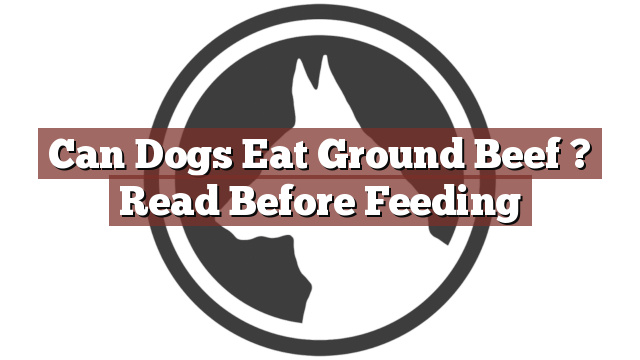Understanding Your Dog’s Dietary Needs
As pet owners, it is vital to understand our dog’s dietary needs to ensure their overall health and well-being. Dogs are carnivores, and their bodies require a balanced diet consisting of proteins, fats, carbohydrates, vitamins, and minerals. While commercial dog food often meets these requirements, many pet owners also like to supplement their dog’s diet with homemade food. However, it is crucial to research and understand which human foods are safe for dogs before introducing them to their diet.
Can Dogs Eat Ground Beef? Read Before Feeding
One common question that arises is, can dogs eat ground beef? The answer is a resounding yes. Ground beef is an excellent source of protein for dogs, which is essential for muscle development and maintenance. It is also a good source of iron, zinc, and B vitamins, which contribute to a healthy immune system, proper digestion, and overall energy levels. However, it is important to note that ground beef should always be cooked thoroughly, as raw meat can contain harmful bacteria such as Salmonella or E. coli that are dangerous for dogs and humans alike.
Pros and Cons of Feeding Ground Beef to Your Dog
Feeding your dog ground beef has its advantages and disadvantages. On the positive side, ground beef is a flavorful and easily digestible protein source that most dogs enjoy. It can be a convenient option for pet owners who prefer to prepare their dog’s meals at home. Additionally, ground beef is often more affordable compared to other types of meat.
However, there are a few cons to consider as well. Ground beef can be high in fat, which may not be suitable for dogs with certain health conditions, such as pancreatitis or obesity. It is important to choose lean ground beef and remove any excess fat before feeding it to your dog. Additionally, ground beef should always be served in moderation as part of a balanced diet, as an excess of any one food can lead to nutritional imbalances.
Conclusion: Make an Informed Decision for Your Dog’s Health
In conclusion, ground beef can be a healthy addition to your dog’s diet if fed in moderation and cooked thoroughly. It provides essential nutrients such as protein, iron, zinc, and B vitamins, which contribute to your dog’s overall health and well-being. However, it is essential to consider your dog’s individual dietary needs, health conditions, and consult with your veterinarian before introducing any new food into their diet.
Remember, every dog is different, and what works for one may not work for another. By making informed decisions about your dog’s diet and considering their specific needs, you can ensure they are receiving the right nutrients and maintaining a healthy lifestyle.
Thank you for taking the time to read through our exploration of [page_title]. As every dog lover knows, our furry friends have unique dietary needs and responses, often varying from one canine to another. This is why it's paramount to approach any changes in their diet with caution and knowledge.
Before introducing any new treats or making alterations to your dog's diet based on our insights, it's crucial to consult with a veterinarian about [page_title]. Their expertise ensures that the choices you make are well-suited to your particular pet's health and well-being.
Even seemingly harmless foods can sometimes lead to allergic reactions or digestive issues, which is why monitoring your dog after introducing any new food item is essential.
The content provided here on [page_title] is crafted with care, thorough research, and a genuine love for dogs. Nevertheless, it serves as a general guideline and should not be considered a substitute for professional veterinary advice.
Always prioritize the expert insights of your veterinarian, and remember that the health and happiness of your furry companion come first.
May your journey with your pet continue to be filled with joy, love, and safe culinary adventures. Happy reading, and even happier snacking for your canine friend!

